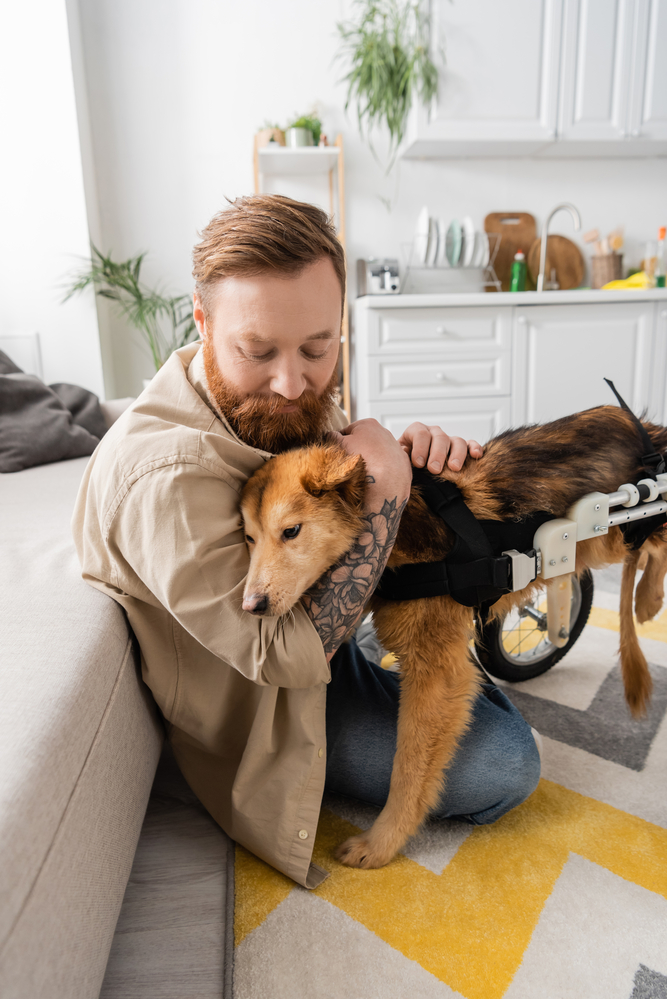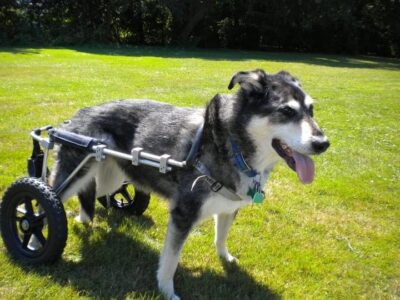If your dog has been diagnosed with DM or is suspected of having the disease, the Riluzole clinical trial is something you should know about.
The study is evaluating a long laundry list of questions about treatment for Canine Degenerative Myelopathy. I’ll explain all of the goals later, but here are two parts that are particularly exciting.
The first goal is to examine how well a recently discovered “biomarker” can track the progression of DM. Biomarkers are molecules that measure small changes in a dog’s chemistry.
And the second goal is to test how well a medicine, made for human patients with ALS, can slow the disease process in dogs.
If you have a dog with DM, you probably know the disease is often compared to Amyotrophic Lateral Sclerosis (ALS) or Lou Gehrig’s Disease, in people. Many of the symptoms of ALS overlap with Degenerative Myelopathy and progression of the two diseases are similar.
Both DM and ALS are neurological diseases that affect the brain, spinal cord and ultimately the organs.

Quick overview of Degenerative Myelopathy
DM is a progressive neurologic disease that attacks the spinal cord of older dogs between the ages of 8-14 years old. The disorder causes a breakdown of the white matter in the spine, which in turn, stops communication between a dog’s brain and body.
“In the beginning, dogs show signs of weakness and lack of coordination in their hind legs. One of the key symptoms are wobbly hind legs. Later, the weakness turns into paralysis of the back limbs. As the disease progresses, it moves to a dog’s front legs and in the later stages it attacks the organs.”
Dog Wheelchair LIFE
The life expectancy for dogs with DM is 2-3 years, although with advances in treatment this number is getting higher. My dog Sophie lived for 5 years with (suspected) Degenerative Myelopathy.
DM has been identified in more than 50 dog breeds. You can read the list of breeds identified as susceptible by the University of Missouri, in this article: Degenerative Myelopathy in Dogs- What Pet Owners Should Know.

eBook
Find The Right Dog Wheelchair For Your Pet
Your dog has a mobility problem, and you want to buy a wheelchair. But do you know what kind of cart will work best for your dog’s individual needs? After a decade of teaching pet owners how to make the right choice, I put the information into an eBook!
How ALS assaults the body
Amyotrophic Lateral Sclerosis (ALS) is a disease of the nervous system. It affects nerves in the brain and spinal cord causing loss of muscle control.
Symptoms in ALS patients get worse over time because they develop excess levels of a chemical called glutamate. The chemical stops communication between the brain and the nervous system.
Researchers aren’t sure if this same process occurs in dogs as well.
The Riluzole study for dogs with Canine Degenerative Myelopathy
In 1995 a medication called Riluzole was approved to treat ALS patients. It was the first FDA approved medicine for the disease. It works by stopping the buildup of glutamate. Over time Riluzole has proven to prolong the quality of life for patients.
Now dogs with Degenerative Myelopathy are being given the opportunity to test Riluzole and see if the medicine works for them.
Sponsored by the AKC Canine Health Foundation and funded in part by Bubba’s Buddies nonprofit organization, this clinical trial has lots of interesting goals.
Researchers hope to solve these questions:
- Is Riluzole safe for dogs?
- Does Riluzole slow the progression of DM symptoms?
- What is the optimal dose?
- How well does the new biomarker track DM symptoms?
The research team is hopeful that all of goals will fall into place, and that Riluzole, at an optimal dose, will delay the later stages of DM.
In addition, the Riluzole study has another unique aspect, thanks to Dr. Joan Coates, who heads the team of researchers. Dr. Coates is a world-renowned veterinary neurologist from the University of Missouri. She’s dedicated her career to investigating treatments that will improve the lives of paralyzed dogs.
In the early 2000s Dr. Coates worked with dogs diagnosed with Intervertebral Disc Disease. Many of her findings, such as ongoing physical therapy for IVDD dogs, are used today to extend the lives of patients.
The unique feature of the Riluzole study is that it’s being conducted at three veterinary universities, at the same time. These include – Ohio State University, Tufts University and North Carolina University. The group call themselves Project DM.
Dr. Coates believes this format will accelerate the research and development of new treatments. Instead of one university studying the problem, three research teams will be working together.

Here’s how Project DM is being conducted
The study began in November 2023 and will finish on November 30, 2024. The goal is to evaluate the effect of Riluzole in dogs with Degenerative Myelopathy.
Dogs participating in Project DM were chosen from a registry created by the three participating veterinary universities.
The study is “randomized and blinded.” That means some of the dogs will receive a Riluzole tablet each day and other dogs will be given a pill that has similar ingredients but doesn’t contain medication. Pet owners and researchers won’t know which dog is receiving medicine and which is receiving the placebo.
Dogs in the study will receive daily doses or Riluzole or the placebo over a one-year period of time.
Each pup will be evaluated at their participating veterinary college several times during the year. The first exam is done at the start of the program, then one month later and every 3 months after that.
In addition, dogs will be anesthetized for a spinal fluid sample at the start of the study and at the 6- and 12-month periods.
Dogs must be at least 7 years old and have been diagnosed with the early stages of Degenerative Myelopathy.
Progress at this point
The first goal of the study has been completed. It was determined that Riluzole is safe for dogs. The FDA-approved the medicine when it’s taken, under the supervision of a veterinarian.
That means the next steps of the clinical trial will start. Researchers will determine if Riluzole can slowdown DM and how well the biomarker can track it.
Look for future articles about the results of this very important clinical trial.




